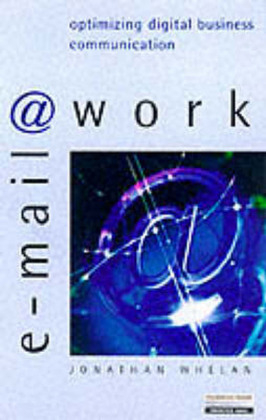
E-Mail @ Work
Get moving with digital communication
Seiten
2000
FT.com (Verlag)
978-0-273-64465-1 (ISBN)
FT.com (Verlag)
978-0-273-64465-1 (ISBN)
- Titel ist leider vergriffen;
keine Neuauflage - Artikel merken
E-mail has reshaped the way today's organizations work. This user-friendly guide gives advice on avoiding pitfalls, and is includes worked examples, checklists, flowcharts and case studies. It also contains email etiquette.
"e-mail@work gives a rational overview of the strengths and weaknesses of e-mail in a business environment and it offers practical advice which I am sure both new and existing business e-mail users will find invaluable." - Steve Ballmer, President, Microsoft Corporation
"E-mail was introduced into many businesses through the back door and it spread in a uncontrolled way. In order to get the full benefit from e-mail it needs to be harnessed and controlled and your book carries this message in a constructive way. Not only did I enjoy reading it, I found it particular and informative – I will certainly refer to it again." - Paul Cartwright, Partner, Andersen Consulting
You would have thought that we would be pretty good at communications, after all, we humans have been communicating face-to-face for over one million years, even though the early vocabulary was limited to a few basic grunts. During that time we have continuously refined the way and speed with which we communicate with one another from carrier pigeon to the fax we got better and faster. The biggest revolution in communication has to have been email. In 1998 there were 100 million people connected to the Internet. A further 10% are getting connected each year. In fact by the time you have finished reading this another 100 people will be connected. The main way people are using the Internet is to send e-mails. E-mail has reshaped the way today's organisations work. For businesses e-mail has virtually replaced the phone and fax as the communication tool of choice. It's quick, it's easy, and it's cheap. E-mail is no longer just a way of communicating in business - it's a way of doing business. But communication via e-mail is easy to misuse or even abuse from unwittingly sending a virus (like Melissa) or getting endless streams of junk e-mail. It is not a secure method of communicating and can be intercepted and copied to others (as Bill Gates discovered recently).
"e-mail@work gives a rational overview of the strengths and weaknesses of e-mail in a business environment and it offers practical advice which I am sure both new and existing business e-mail users will find invaluable." - Steve Ballmer, President, Microsoft Corporation
"E-mail was introduced into many businesses through the back door and it spread in a uncontrolled way. In order to get the full benefit from e-mail it needs to be harnessed and controlled and your book carries this message in a constructive way. Not only did I enjoy reading it, I found it particular and informative – I will certainly refer to it again." - Paul Cartwright, Partner, Andersen Consulting
You would have thought that we would be pretty good at communications, after all, we humans have been communicating face-to-face for over one million years, even though the early vocabulary was limited to a few basic grunts. During that time we have continuously refined the way and speed with which we communicate with one another from carrier pigeon to the fax we got better and faster. The biggest revolution in communication has to have been email. In 1998 there were 100 million people connected to the Internet. A further 10% are getting connected each year. In fact by the time you have finished reading this another 100 people will be connected. The main way people are using the Internet is to send e-mails. E-mail has reshaped the way today's organisations work. For businesses e-mail has virtually replaced the phone and fax as the communication tool of choice. It's quick, it's easy, and it's cheap. E-mail is no longer just a way of communicating in business - it's a way of doing business. But communication via e-mail is easy to misuse or even abuse from unwittingly sending a virus (like Melissa) or getting endless streams of junk e-mail. It is not a secure method of communicating and can be intercepted and copied to others (as Bill Gates discovered recently).
Jonathan Whelan has worked in IT for over 10 years. Recently, as a business systems consultant, he has focused on the significance and impact of technology to businesses and the general public. An experience writer, he has had numerous articles published and a best-selling book: The Year 2000 Computer Problem (NatWest plc, 1997), which was awarded the Crystal Mark for its clarity.
| Erscheint lt. Verlag | 6.3.2000 |
|---|---|
| Verlagsort | Harlow |
| Sprache | englisch |
| Maße | 172 x 210 mm |
| Gewicht | 430 g |
| Themenwelt | Informatik ► Netzwerke ► Mail Server |
| Mathematik / Informatik ► Mathematik ► Finanz- / Wirtschaftsmathematik | |
| ISBN-10 | 0-273-64465-3 / 0273644653 |
| ISBN-13 | 978-0-273-64465-1 / 9780273644651 |
| Zustand | Neuware |
| Haben Sie eine Frage zum Produkt? |
Mehr entdecken
aus dem Bereich
aus dem Bereich
die Anleitung in Bildern : auch für Microsoft Outlook 365 geeignet
Buch | Softcover (2023)
Vierfarben (Verlag)
CHF 23,65
Buch | Softcover (2021)
Addison Wesley (Verlag)
CHF 38,50

